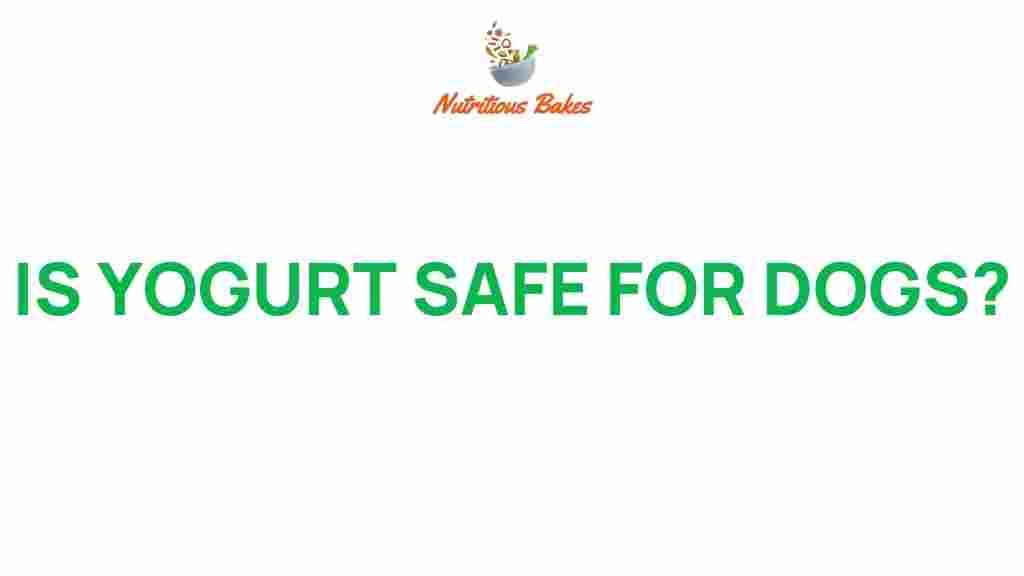Is Yogurt Safe for Dogs? Understanding Yogurt for Dogs
As a dog owner, you always want the best for your furry friend. You may have heard about the benefits of yogurt for dogs and wondered whether it’s safe to include in their canine diet. With the rise of pet nutrition awareness, many pet parents are looking for healthy snacks that can supplement their dog’s diet. In this article, we will uncover the truth behind yogurt as a treat for dogs, examining its benefits, potential risks, and how to safely incorporate it into your pet’s routine.
The Benefits of Yogurt for Dogs
Yogurt can be a nutritious addition to your dog’s diet when offered in moderation. Here are some of the benefits:
- Probiotics for Dogs: Yogurt is rich in probiotics, which are beneficial bacteria that can aid in digestion and promote gut health.
- Calcium Source: Yogurt provides a good source of calcium, essential for maintaining strong bones and teeth in dogs.
- Protein Boost: This dairy product contains protein, which is vital for muscle development and overall health.
- Lower in Lactose: Many dogs can tolerate yogurt better than other dairy products, as the fermentation process reduces lactose levels.
Choosing the Right Yogurt for Dogs
Not all yogurts are created equal. When selecting yogurt for dogs, keep the following tips in mind:
- Plain and Unsweetened: Always choose plain yogurt without added sugars or artificial sweeteners, as these can be harmful to dogs.
- Low-Fat Options: Low-fat yogurt can be a healthier option, especially for dogs that are prone to obesity.
- No Flavors: Avoid flavored yogurts, as they often contain ingredients that may be toxic to dogs, such as chocolate or xylitol.
How to Safely Introduce Yogurt into Your Dog’s Diet
Incorporating yogurt into your dog’s diet should be done gradually. Here’s a step-by-step process:
- Start Small: Begin with a small amount, like a teaspoon, to see how your dog reacts.
- Observe for Reactions: Watch for any signs of digestive upset, such as diarrhea or vomiting. If these occur, discontinue use.
- Mix with Food: You can mix yogurt into your dog’s regular food to enhance flavor and provide additional nutrients.
- Use as a Treat: Yogurt can also be used as a healthy treat. You can freeze it in ice cube trays for a refreshing snack on hot days.
Potential Risks of Yogurt for Dogs
While yogurt can be beneficial, there are some risks to consider:
- Dairy Sensitivity: Some dogs are lactose intolerant and may have trouble digesting dairy products, leading to gastrointestinal issues.
- Calories Count: Yogurt contains calories, so it should be considered part of your dog’s daily caloric intake to prevent weight gain.
- Allergies: Be cautious if your dog has a known allergy to dairy. Always consult your veterinarian if unsure.
Dog Food Safety: Storing Yogurt
To ensure dog food safety, consider the following storage tips for yogurt:
- Refrigerate: Always store yogurt in the refrigerator to prevent spoilage.
- Check Expiration Dates: Never feed your dog yogurt that is past its expiration date.
- Avoid Contamination: Use clean utensils when serving yogurt to prevent bacterial contamination.
Healthy Snack Ideas Using Yogurt for Dogs
Yogurt can be a versatile ingredient for creating healthy snacks for dogs. Here are some ideas:
- Frozen Yogurt Treats: Mix yogurt with pureed fruits like bananas or blueberries, pour into molds, and freeze for a cool snack.
- Yogurt and Peanut Butter: Combine yogurt with a small amount of dog-safe peanut butter for a tasty treat.
- Yogurt Toppers: Use yogurt as a topping for your dog’s kibble or wet food to add flavor and nutrition.
Probiotics for Dogs: The Gut Health Connection
Probiotics for dogs play a crucial role in maintaining overall health. They help balance the gut microbiome, which is vital for:
- Improving digestion
- Boosting the immune system
- Reducing the risk of gastrointestinal diseases
Incorporating yogurt into your dog’s diet can be an excellent way to introduce these beneficial probiotics. However, if you’re looking for a concentrated source of probiotics, consider probiotic supplements specifically formulated for dogs.
Common Concerns: Dairy and Pets
The relationship between dairy and pets can be complex. While some dogs can enjoy dairy products like yogurt without issues, others may face challenges. Here are some common concerns:
- Lactose Intolerance: As mentioned earlier, many dogs are lactose intolerant. Monitor your dog’s reaction when introducing yogurt.
- Weight Management: If your dog is overweight, consult with your veterinarian to ensure that yogurt fits into their diet without contributing to weight gain.
- Overall Diet Balance: Yogurt should be considered a supplement to a well-balanced diet, not a replacement for a complete dog food.
Troubleshooting: What to Do if Your Dog Reacts Negatively
If your dog has a negative reaction after consuming yogurt, follow these steps:
- Stop Feeding Yogurt: Immediately discontinue giving yogurt to your dog.
- Monitor Symptoms: Keep an eye on your dog for any ongoing symptoms, such as diarrhea or vomiting.
- Consult Your Veterinarian: If symptoms persist or are severe, contact your veterinarian for advice and potential alternatives.
Conclusion: Is Yogurt Safe for Dogs?
In conclusion, yogurt can be a safe and nutritious treat for most dogs when offered in moderation. With its probiotic content, calcium, and protein, yogurt can contribute positively to your dog’s health and well-being. However, it is essential to choose the right type of yogurt, monitor for any adverse reactions, and consult with your veterinarian if you have any doubts.
Always remember that every dog is unique. What works for one may not work for another. If you’re looking for safe treats to enhance your dog’s diet, yogurt can be a delightful option, provided you adhere to the guidelines outlined in this article.
For more information on dog nutrition and healthy treats, be sure to visit our pet nutrition resources.
This article is in the category Treats and created by NutritiousBakes Team
